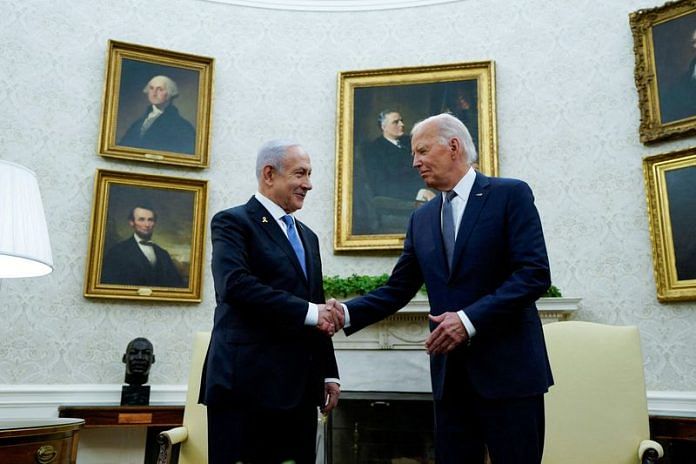By Matt Spetalnick and Jonathan Landay
WASHINGTON (Reuters) – Joe Biden is expected to use Israel’s killing of Hamas leader Yahya Sinwar to pressure Prime Minister Benjamin Netanyahu to wind down the war in Gaza, but in the waning months of his term the U.S. president may lack leverage to bend the Israeli leader to his will.
The demise of Sinwar, mastermind of Hamas’ Oct. 7, 2023 attack on Israel that started the latest bloody chapter in the Israeli-Palestinian conflict, raised hopes that it might spur resumption of long-stalled negotiations for a Gaza ceasefire-and-hostage deal that Biden has long sought.
But such an outcome is far from certain as Biden faces a cascade of interlocking Middle East crises.
His efforts to bring peace to Gaza will be complicated by Israel’s parallel fight against Hezbollah in Lebanon as well as Israeli preparations to retaliate against Iran, which backs both the Lebanese militant group and Hamas, for its ballistic-missile barrage this month.
“Sinwar’s death would provide a renewed opening for President Biden to again push for the first phase of the ceasefire deal to be implemented and it would increase pressure on Netanyahu to do so,” said Jonathan Panikoff, the former deputy U.S. national intelligence officer on the Middle East.
“Whether a deal could be struck for a cessation of hostilities will depend on the new Hamas leader — and on Netanyahu’s willingness to finally declare victory and make a deal,” said Panikoff, now at the Atlantic Council think-tank.
With the clock ticking down on his presidency and the Nov. 5 U.S. election looming, Biden may struggle to get Netanyahu to fully heed his entreaties.
Though the Biden administration this week told Israel it must improve Gaza’s humanitarian situation or face potential restrictions on U.S. military aid, it remains unclear how strongly the U.S. is prepared to act on this warning.
Netanyahu, some analysts say, may prefer to wait out the end of Biden’s term in January and take his chances with the next president, whether the Democratic candidate, Vice President Kamala Harris, or Republican rival Donald Trump, with whom the Israeli leader has had close ties.
The White House did not immediately respond to a request for comment on the challenges Biden faces.
Jon Alterman, a former State Department official now at the Center for Strategic & International Studies think-tank in Washington, expressed pessimism that Netanyahu would respond to renewed pressure from Biden to resume Gaza talks brokered by Egypt and Qatar.
“Bibi’s like a gambler with a hot hand, and in his mind, all the big risks he’s taken in the last six months, which people said were crazy, have paid off, and most spectacularly in killing Yahya Sinwar,” said Alterman, referring to Netanyahu by his nickname.
SHIFTING DEMANDS
The Biden administration had long blamed Sinwar, Hamas’ top political and strategic thinker, as the main obstacle to a truce and exchange of hostages held by the group for prisoners held by Israel.
But even as they cited Sinwar’s refusal to compromise, some U.S. officials had privately criticized Netanyahu for intransigence and shifting demands as he sought to placate far-right members of his governing coalition.
Netanyahu wasted little time declaring that the killing of Sinwar “settled the score” with the “evil” Hamas leader while also insisting that the war in Gaza was not over and Israel would continue fighting until its hostages were returned.
In a statement issued a short time later, Biden backed Israel’s right to eliminate Hamas’ leadership but pivoted to saying he would discuss with Netanyahu a pathway “for ending this war once and for all.”
The contrasts between Biden’s and Netanyahu’s words reflected some of the differences between them over the Israeli leader’s prosecution of the war in Gaza and could foreshadow further tensions.
Sinwar was named Hamas’ leader following the assassination of political chief Ismail Haniyeh in Tehran in July. That was followed by Israel’s assassination of Hezbollah leader Hassan Nasrallah in Beirut last month.
While some analysts suggest Sinwar’s death could give Netanyahu political cover to negotiate with more flexibility, any move to strike a deal with Hamas is likely to face fierce resistance from far-right cabinet members who have opposed the previously proposed terms for an agreement.
Israeli officials did not immediately respond to a request for comment.
Also dimming prospects for Biden to reinvigorate Gaza peace efforts are questions about who will replace Sinwar, who had unrivalled influence within Hamas. None of his potential successors has the same standing.
It is unknown who might negotiate for Hamas and have the authority to make decisions. Hamas officials could not immediately be reached for comment.
“As a practical matter, how one executes a ceasefire or achieves a ceasefire with the command-and-control structures of Hamas in disarray is really a challenge,” said Brian Katulis, a senior fellow at the Middle East Institute think-tank in Washington.
From the Israeli perspective, some analysts say, now might be the time to hit leader-less Hamas harder instead of backing off, raising the prospects that the war could intensify.
“With Israel’s revenge account still open with Iran and proxy rockets dropping on Tel Aviv, it will be hard for PM Netanyahu to pivot to peace,” said Laura Blumenfeld, a Middle East analyst at the Johns Hopkins School for Advanced International Studies in Washington.
(Additional reporting by Nidal al-Mughrabi in Cairo and Phil Stewart; Editing by Don Durfee and Rod Nickel)
Disclaimer: This report is auto generated from the Reuters news service. ThePrint holds no responsibilty for its content.



